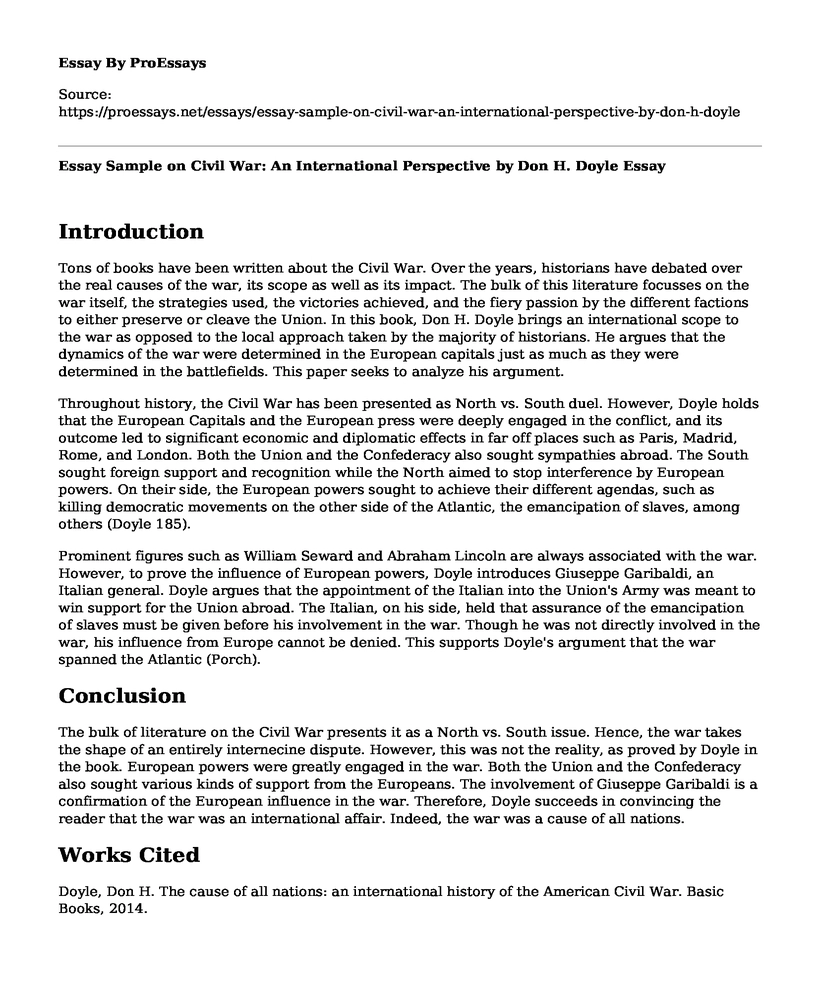Introduction
Tons of books have been written about the Civil War. Over the years, historians have debated over the real causes of the war, its scope as well as its impact. The bulk of this literature focusses on the war itself, the strategies used, the victories achieved, and the fiery passion by the different factions to either preserve or cleave the Union. In this book, Don H. Doyle brings an international scope to the war as opposed to the local approach taken by the majority of historians. He argues that the dynamics of the war were determined in the European capitals just as much as they were determined in the battlefields. This paper seeks to analyze his argument.
Throughout history, the Civil War has been presented as North vs. South duel. However, Doyle holds that the European Capitals and the European press were deeply engaged in the conflict, and its outcome led to significant economic and diplomatic effects in far off places such as Paris, Madrid, Rome, and London. Both the Union and the Confederacy also sought sympathies abroad. The South sought foreign support and recognition while the North aimed to stop interference by European powers. On their side, the European powers sought to achieve their different agendas, such as killing democratic movements on the other side of the Atlantic, the emancipation of slaves, among others (Doyle 185).
Prominent figures such as William Seward and Abraham Lincoln are always associated with the war. However, to prove the influence of European powers, Doyle introduces Giuseppe Garibaldi, an Italian general. Doyle argues that the appointment of the Italian into the Union's Army was meant to win support for the Union abroad. The Italian, on his side, held that assurance of the emancipation of slaves must be given before his involvement in the war. Though he was not directly involved in the war, his influence from Europe cannot be denied. This supports Doyle's argument that the war spanned the Atlantic (Porch).
Conclusion
The bulk of literature on the Civil War presents it as a North vs. South issue. Hence, the war takes the shape of an entirely internecine dispute. However, this was not the reality, as proved by Doyle in the book. European powers were greatly engaged in the war. Both the Union and the Confederacy also sought various kinds of support from the Europeans. The involvement of Giuseppe Garibaldi is a confirmation of the European influence in the war. Therefore, Doyle succeeds in convincing the reader that the war was an international affair. Indeed, the war was a cause of all nations.
Works Cited
Doyle, Don H. The cause of all nations: an international history of the American Civil War. Basic Books, 2014.
Porch, Scott. "Review: 'The Cause of All Nations' by Don H. Doyle." 24 December 2014. Chicago Tribune. 3 December 2019. <https://www.chicagotribune.com/entertainment/books/ct-prj-cause-of-all-nations-don-doyle-20141224-story.html>.
Cite this page
Essay Sample on Civil War: An International Perspective by Don H. Doyle. (2023, Mar 12). Retrieved from https://proessays.net/essays/essay-sample-on-civil-war-an-international-perspective-by-don-h-doyle
If you are the original author of this essay and no longer wish to have it published on the ProEssays website, please click below to request its removal:
- Essay Sample on the Cherokees Removal
- Critical Essay on Role of Women in William Shakespeare's Hamlet
- Critical Essays Discussing the Short Story "A Good Man is Hard to Find" by Flannery O'Connor
- Comparing Seasons of the Mist and Paradise Lost Essay Example
- Essay on Equiano's Exposed to English Culture: A Life-Changing Encounter
- Paper Example on Romanian Army Joins Soviet Union's 'Holy War' in 1941
- Essay Sample on Intelligence World: Surveillance & Information Processing Post-9/11







